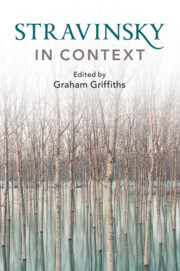Book contents
- Stravinsky in Context
- Composers in Context
- Stravinsky in Context
- Copyright page
- Contents
- Illustrations
- Contributors
- Preface
- Abbreviations
- Frontispiece
- Epigraph
- Part I Russia and Identity
- Part II Stravinsky and Europe
- Part III Partnerships and Authorship
- Part IV Performance and Performers
- Part V Aesthetics and Politics
- Part VI Reception and Legacy
- Chapter 29 The Apollonian Clockwork Rewound
- Chapter 30 Stravinsky Reception in the USSR
- Chapter 31 The Stravinsky/Craft Conversations in Russian and Their Reception
- Chapter 32 Publishing Stravinsky
- Chapter 33 Copyright, the Stravinsky Estate and the Paul Sacher Foundation
- Chapter 34 Evoking the Past, Inspiring the Future
- Chapter 35 ‘Music is, by its very nature, essentially powerless to express anything at all’
- Recommendations for Further Reading and Research
- Index
- Endmatter
Chapter 35 - ‘Music is, by its very nature, essentially powerless to express anything at all’
from Part VI - Reception and Legacy
Published online by Cambridge University Press: 03 December 2020
- Stravinsky in Context
- Composers in Context
- Stravinsky in Context
- Copyright page
- Contents
- Illustrations
- Contributors
- Preface
- Abbreviations
- Frontispiece
- Epigraph
- Part I Russia and Identity
- Part II Stravinsky and Europe
- Part III Partnerships and Authorship
- Part IV Performance and Performers
- Part V Aesthetics and Politics
- Part VI Reception and Legacy
- Chapter 29 The Apollonian Clockwork Rewound
- Chapter 30 Stravinsky Reception in the USSR
- Chapter 31 The Stravinsky/Craft Conversations in Russian and Their Reception
- Chapter 32 Publishing Stravinsky
- Chapter 33 Copyright, the Stravinsky Estate and the Paul Sacher Foundation
- Chapter 34 Evoking the Past, Inspiring the Future
- Chapter 35 ‘Music is, by its very nature, essentially powerless to express anything at all’
- Recommendations for Further Reading and Research
- Index
- Endmatter
Summary
Stravinsky is a purveyor of shocking comments. Just as he could capture in a single chord the essence of The Rite of Spring, he could frame an aesthetic position with an imminently quotable aperçu: ‘music is, by its very nature, essentially powerless to express anything at all’.1 This remark on the nature of music, published in his 1936 autobiography, is one of his most quoted comments. In fact, it gained enough notoriety to prod Stravinsky to clarify his position some twenty years later, regarding what he called the ‘over-publicized bit about expression (or non-expression)’. Given a chance to repeat himself, he said, he would rephrase the remark; it was not so much that music is ‘powerless to express anything’, he explained, but that ‘music expresses itself’.2 In the first case, music is defined negatively as that which excludes everything but itself; it is not ‘a feeling, an attitude of mind, a psychological mood, a phenomenon of nature’. In the second case, music is given a positive spin as that which includes itself and nothing else; music is its own expression, ‘beyond verbal meanings and verbal descriptions’. In both cases, the composer is saying the same thing – it just depends whether your aesthetic glass is half full or half empty; music in expressing itself is ‘powerless to express anything’ other than itself. That is why Stravinsky staunchly asserted in 1959 that he still stood by his earlier remark of 1936.
- Type
- Chapter
- Information
- Stravinsky in Context , pp. 313 - 321Publisher: Cambridge University PressPrint publication year: 2020

